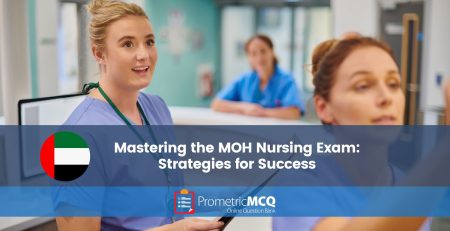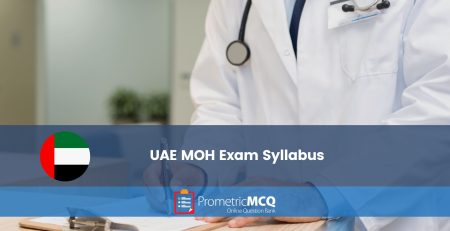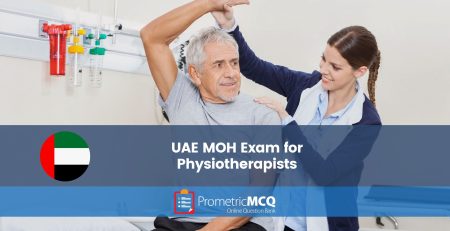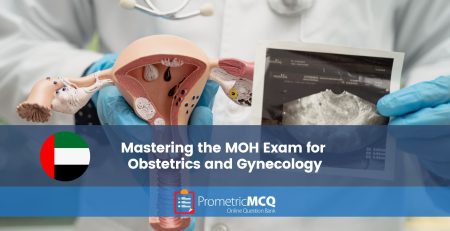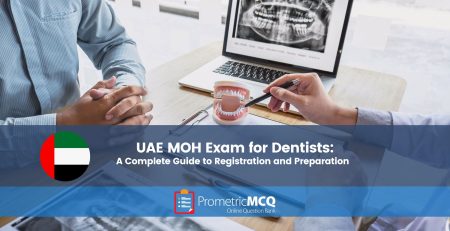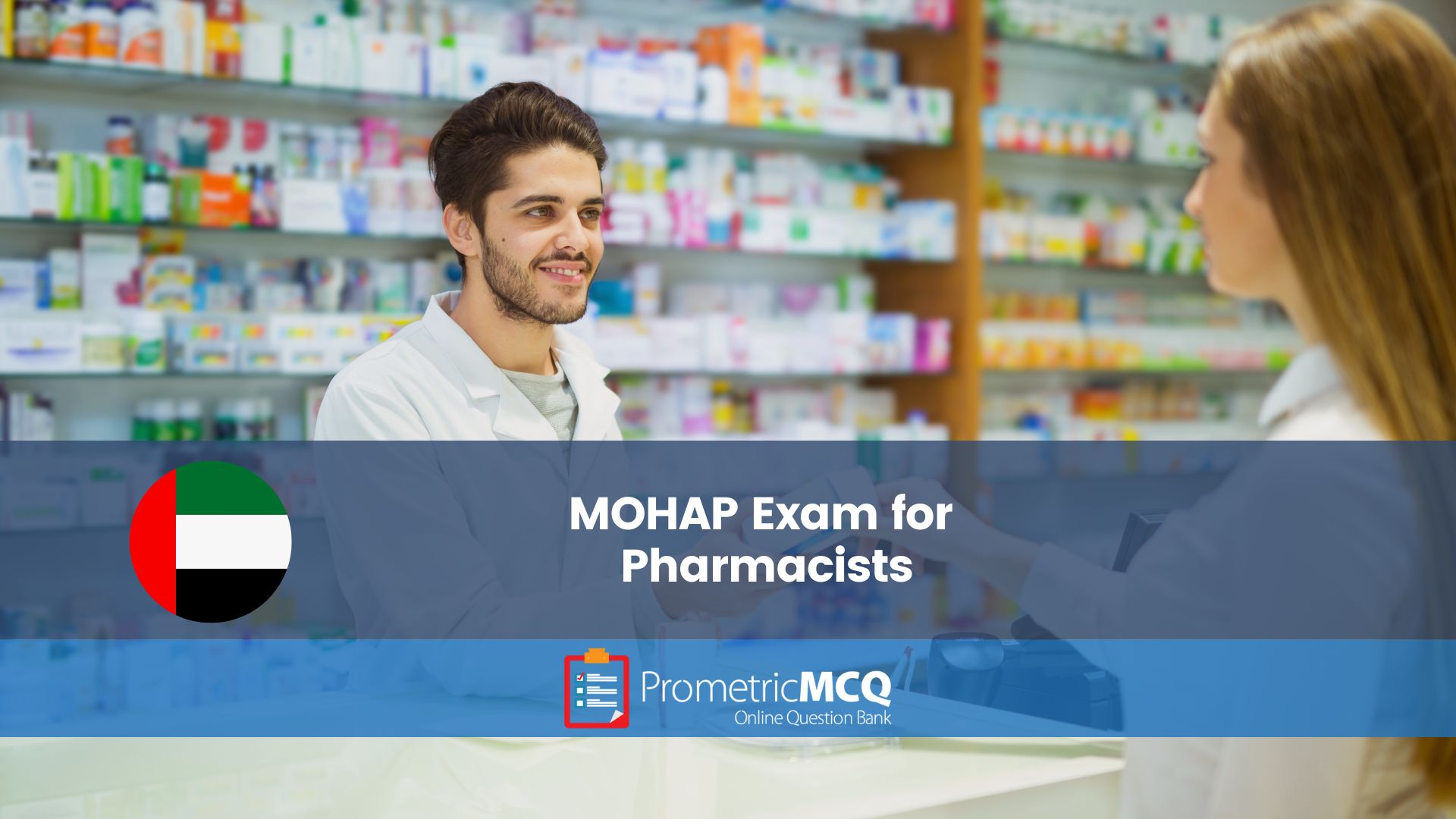
MOH Exam for Pharmacist in UAE
Webmaster2024-03-17T02:06:30+00:00Table of Contents
ToggleThe Step-by-Step Guide to Passing the MOH Exam for Pharmacists
Are you a pharmacist looking to advance your career and practice in the United Arab Emirates? Look no further! In this comprehensive guide, we will walk you through each step of the process to successfully pass the UAE Ministry of Health – MOH exam for pharmacists. From application requirements to study tips and test-taking strategies, we’ve got you covered. Get ready to take your career to new heights with our step-by-step guide!
Embark on this journey with us as we equip you with the knowledge and resources essential for conquering the MOHAP exam, paving the way for a successful career in the vibrant healthcare landscape of the UAE.
Introduction to the MOH Exam for Pharmacist
Becoming a licensed pharmacist in the United Arab Emirates (UAE) requires successfully clearing the Ministry of Health and Prevention (MOHAP) exam. This rigorous examination not only tests the knowledge and skills of aspiring pharmacists but also ensures the quality of healthcare services provided in the country. Clearing the MOHAP exam also known as MOH Exam for Pharmacist is a crucial step towards establishing a successful career in the UAE’s healthcare sector.
Obtaining a MOH pharmacist license through the MOH exam for pharmacist opens up a world of opportunities. Licensed pharmacists are highly respected professionals who play a vital role in patient care and medication management. They are sought after by various healthcare centers, hospitals, and pharmaceutical companies across the UAE, offering lucrative career prospects and job stability.
Beyond the career benefits, passing the MOH exam for pharmacist demonstrates an individual’s commitment to excellence in their field. It showcases their dedication to upholding the highest standards of patient care, medication safety, and professional ethics. Furthermore, being a licensed pharmacist provides the opportunity to contribute to the overall healthcare system, improving the well-being of the population in the UAE.
In the following sections, we will delve deeper into the significance of the MOH exam for pharmacist and explore the MOH exam eligibility criteria for pharmacist, exam format, strategies to excel, and step-by-step guidance on obtaining a MOHAP pharmacist license. So let’s begin this comprehensive guide to help you successfully navigate the MOHAP exam journey and embark on a fulfilling career as a licensed pharmacist in the UAE.
Why do Pharmacists Need to Take the Exam?
The MOH exam for pharmacist plays a crucial role in ensuring the quality of healthcare services in the United Arab Emirates (UAE). It serves as a means to assess and validate the knowledge and competence of MOH licensed pharmacists practicing in the country. Here are the key reasons why pharmacists need to take the MOHAP exam:
- Ensuring Patient Safety: The MOH exam for pharmacist evaluates the knowledge, skills, and expertise of pharmacists, ensuring that they are equipped to provide safe and effective pharmaceutical care to patients. By passing the exam, pharmacists demonstrate their ability to dispense medications accurately, offer appropriate counseling, and identify and prevent drug interactions or errors.
- Maintaining Quality Standards: The MOH exam for pharmacist sets a benchmark for pharmacists’ competence, ensuring that they are up to date with the latest advancements and best practices in the field of pharmacy. By assessing their knowledge and expertise, the exam ensures that licensed pharmacists adhere to the highest quality standards in patient care.
- Professional Development: Taking the MOH exam for pharmacist provides an opportunity for pharmacists to continuously enhance their knowledge and skills. The exam content covers vital topics such as drug classifications, pharmacotherapy, pharmaceutical calculations, and therapeutic management. By studying for the exam, pharmacists deepen their understanding of these subjects, enabling them to be more effective healthcare professionals.
- Career Advancement: Clearing the MOH exam for pharmacist opens up a wide range of career opportunities for pharmacists in the UAE. It serves as evidence of their expertise and competence, making them more attractive to potential employers. Pharmacists with a MOHAP license can work in various settings, including hospitals, community pharmacies, pharmaceutical industry, and research institutions.
- Regulatory Compliance: The MOH exam for pharmacist is a regulatory requirement for pharmacists practicing in the UAE. It ensures that all licensed pharmacists meet the standards set by the Ministry of Health and Prevention. Being compliant with these regulations is essential for pharmacists to legally practice their profession and fulfill their responsibilities towards patient care.
By taking the MOHAP exam, pharmacists demonstrate their commitment to providing quality healthcare services and staying updated with the latest advancements in their field. It not only validates their knowledge and competence but also opens up new opportunities for professional growth and career development.
Understanding the Eligibility Criteria for the MOH License for Pharmacist
To pursue a career as a MOH licensed pharmacist in the United Arab Emirates (UAE), it is important to understand the eligibility criteria for the Ministry of Health and Prevention (MOHAP) license also known as MOH License. Meeting these requirements is the initial step towards clearing the MOH exam and obtaining the necessary credentials to practice pharmacy in the UAE.
Years of Work Experience
To be eligible for the MOH Pharmacist license, candidates must have a minimum of two years of work experience in the field of pharmacy. This experience should be gained after obtaining a recognized pharmacy degree. It is essential to provide documentation and proof of employment for the specified duration.
Skill Assessment
Applicants for the MOH license for pharmacists are required to undergo a skill assessment to demonstrate their competency and knowledge in the field of pharmacy. This assessment ensures that licensed pharmacists possess the necessary skills and expertise to provide quality healthcare services in the UAE. The assessment evaluates various aspects related to pharmacy practice, including regulatory knowledge, patient care, drug information, and ethical considerations.
Necessary Documentation MOH pharmacist license
To complete the application process for the MOH pharmacist license, candidates must submit the required documentation. This typically includes:
- Education: Minimum of Bachelor’s degree in Pharmacy: To be eligible to take the MOH exam, you must have a Bachelor’s degree in Pharmacy from a recognized university or college, also official transcript.
- Passport copy: A valid passport for identification purposes.
- Passport-sized photographs: Recent photographs with specific dimensions as specified by MOHAP.
- Good Standing Certificate: A document from the applicant’s regulatory authority that verifies their good standing as a pharmacist.
- Internship/Practical training: Some countries require a certain number of internship hours before allowing candidates to sit for the MOH exam. Make sure you have completed all necessary practical training before applying for the exam.
- Experience certificate: Official documentation from previous employers indicating the duration and nature of work
- Registration/License: You may be required to have a valid license or registration from your home country’s pharmacy council before taking the MOH exam.
It is important to ensure that all documentation meets the specified requirements and is in the preferred format before submitting the application. Failure to provide accurate and complete documentation may result in delays or rejection of the application.
By understanding the eligibility criteria for the MOHAP license for Pharmacist, aspiring pharmacists can adequately prepare themselves for the application process and increase their chances of successfully obtaining the license. Meeting the requirements in terms of work experience, skill assessment, and documentation is essential for progressing towards a rewarding career as a licensed pharmacist in the UAE.
Remember, diligent preparation and compliance with the eligibility criteria are key factors in clearing the MOH exam and embarking on a successful career in pharmacy.
A Step-by-Step Guide to Getting a MOHAP Pharmacist License
To become a licensed pharmacist in the United Arab Emirates (UAE), it is essential to clear the Ministry of Health and Prevention (MOHAP) exam. This comprehensive guide will take you through the step-by-step process of preparing for and applying for the MOHAP pharmacist license. By following these instructions, you can increase your chances of success and secure your career as a pharmacist in the UAE.
Creating a MOHAP Account
The first step in the process is to create a MOHAP account. Visit the official MOHAP website and navigate to the registration section. Fill in the necessary details, including your personal information, contact details, and qualifications. Make sure to provide accurate information to avoid any complications during the application process.
Primary Source Verification Process
After creating your MOHAP account, the next step is to undergo the primary source verification process. This involves validating your educational credentials, work experience, and other relevant documents. MOHAP has an official verification service provider, and you will be required to submit the necessary documents and pay the verification fee. The verification process may take some time, so it is advisable to start this step well in advance.
Scheduling the Exam
Once your primary source verification is complete, you will receive an eligibility number. With this number, you can schedule your MOHAP exam through the Prometric website. Choose a convenient date and location from the available options. Keep in mind the exam syllabus and topics covered while scheduling your exam date to allow enough time for thorough preparation.
Taking the Exam
On the day of the exam, make sure to arrive at the Prometric test center well ahead of time. Follow all the guidelines provided and carry the necessary identification, such as your passport or Emirates ID. The MOHAP exam is a computer-based test (CBT), consisting of multiple-choice questions. Manage your time wisely and answer each MOH exam questions for pharmacist confidently. Remember to read the MOH exam for pharmacist question papers carefully and select the most appropriate answer.
By following this step-by-step guide, you will be well-prepared to navigate the process of obtaining a MOHAP pharmacist license. Ensure that you have a solid study plan in place, access to necessary study material, and a thorough understanding of the exam content. Good luck on your journey to becoming an officially licensed pharmacist in the UAE!
What to Expect on the MOH Exam for Pharmacist
The MOH exam for pharmacists plays a crucial role in determining the competence and knowledge of healthcare professionals aspiring to practice in the United Arab Emirates. To succeed in this exam, it’s essential to have a thorough understanding of its format and content. Let’s dive into what you can expect when taking the MOHAP exam.
Exam Format and Structure
The MOH exam for pharmacist is a Computer-Based Test (CBT) conducted by the Ministry of Health and Prevention. It consists of multiple-choice questions designed to assess your aptitude and proficiency in the field of pharmacy. The exam is divided into different sections, each focusing on specific subject areas.
Number of Questions and Time Limit
The exam typically consists of around 100 to 150 questions, depending on the specific version. You’ll be provided with a specific time limit to complete the exam, ranging from two to three hours. It’s crucial to manage your time effectively to ensure you can answer all the questions within the given timeframe.
Topics Covered
The exam covers a wide range of topics relevant to the field of pharmacy. These include pharmacology, pharmaceutical calculations, pharmaceutical legislation and regulations, clinical pharmacy practice, and drug information resources. It’s important to have a solid understanding of these subjects and stay updated with the latest developments in the field.
Preparation Tips for Different Sections
To excel in each section of the MOH exam for pharmacist, it’s essential to adopt a strategic and focused approach. Here are some tips to help you prepare effectively:
- Review the MOH exam syllabus for Pharmacist: Familiarize yourself with the topics outlined in the MOH exam syllabus for Pharmacist and allocate sufficient time for each area of study.
- Practice MOH past exam papers: Solve previous exam papers to get a clear idea of the MOH sample questions for pharmacist format and practice time management.
- Focus on vital topics: Identify key subject areas and allocate more study time to topics that carry more weightage in the exam.
- Join study groups: Collaborate with fellow aspiring pharmacists to share knowledge, discuss challenging topics, and benefit from collective learning.
- Develop effective test-taking strategies: Learn techniques such as process of elimination, time allocation per question, and effective reading strategies to enhance your performance during the exam.
Remember, thorough preparation and a systematic approach are key to performing well in the MOHAP exam. Best of luck as you embark on this important step towards becoming a licensed pharmacist in the UAE!
Top 5 Strategies to Ace the MOH exam for pharmacist
Preparing for the MOHAP exam requires a systematic approach and effective study strategies to maximize your chances of success. Here are the top five strategies and study tips that will help you ace the exam:
1. Create a Solid Study Plan
Developing a well-structured study plan is essential for efficient and focused preparation. Start by allocating specific time slots for each subject and topic based on their weightage in the exam. Break down your study sessions into manageable chunks, allowing time for revision and practice. Use study calendars or apps to stay organized and track your progress.
2. Join Study Groups
Collaborating with fellow candidates through study groups can enhance your understanding of the exam content. Engaging in discussions, sharing study materials, and solving practice questions together can boost your retention and provide different perspectives. Additionally, explaining concepts to others can solidify your own understanding.
3. Practice Past Exam Papers
Practicing with previous years’ exam papers is crucial for familiarizing yourself with the exam format, time constraints, and question patterns. This enables you to identify your weak areas and focus your study efforts accordingly. Analyze your performance, review the answers, and understand the reasoning behind each option to improve your problem-solving skills.
4. Utilize Reliable Study Materials
Choose study materials, textbooks, and online resources that cover the exam syllabus comprehensively. Ensure that the content is up-to-date and follows the official guidelines. Trusted resources recommended by qualified healthcare professionals or academically recognized institutions are highly recommended for a thorough understanding of the exam content.
5. Adopt Test-Taking Strategies
Develop effective strategies for managing time and answering questions during the exam. Read the questions carefully, identify keywords, and eliminate any obviously incorrect options. Prioritize questions that you are confident about and revisit more challenging ones later. Avoid spending too much time on a single question to ensure you answer all the questions within the time limit.
Remember, success in the MOHAP exam requires a combination of hard work, dedication, and a well-rounded preparation strategy. Stay focused, maintain a positive mindset, and utilize these strategies to excel in your journey toward becoming a licensed pharmacist in the UAE.
Good luck!
Final Thoughts
In conclusion, clearing the MOHAP exam is a crucial step for pharmacists who aspire to practice in the United Arab Emirates. By obtaining the pharmacist license, you open doors to a world of opportunities in the UAE healthcare industry. Throughout this comprehensive guide/course, we have provided invaluable insights, strategies, and resources to help you succeed in the exam and secure your future as a licensed pharmacist.
It is important to remember that diligent preparation and hard work are key to achieving your goals. Create a solid study plan, utilize necessary study materials, and join study groups to enhance your learning experience. Practice past exam papers and familiarize yourself with the exam format to boost your confidence on the exam day. Remember, a systematic approach and a thorough understanding of the exam content are vital for success.
With the support of our qualified teaching staff and our vast experience in MOH exam for pharmacist preparation, we are confident that you can ace the exam. Don’t hesitate to take the next step and register for the Ministry of Health exam for pharmacist. Your dedication and effort will pay off, and a rewarding career as a pharmacist in the UAE awaits you.
Good luck on your journey, and we look forward to celebrating your success as an officially licensed pharmacist in the UAE!
Remember, if you have any additional questions or need further guidance, our team of experts is here to assist you every step of the way.
Frequently Asked Questions about MOH Exam for Pharmacist:
The MOH (Ministry of Health and Prevention) exam for pharmacists in the UAE is a licensing examination that pharmacists must pass to practice in certain regions of the United Arab Emirates. This exam ensures that pharmacists have the necessary knowledge and skills to deliver quality healthcare services.
The MOH exam is primarily for those who wish to practice in the Northern Emirates, which includes Sharjah, Ajman, Umm Al-Quwain, Fujairah, and Ras Al Khaimah.
Pharmacists seeking to work in Dubai or Abu Dhabi would need to pass the DHA (Dubai Health Authority) and HAAD (Health Authority of Abu Dhabi) exams, respectivel
The eligibility criteria for the MOH exam for pharmacists in the UAE include several key requirements:
-
Educational Qualification: Applicants must have a Bachelor of Pharmacy degree from a recognized institution. For graduates from the UAE, the program and university must be accredited by the Ministry of Education (MOE/NQA). For foreign graduates, specific countries’ degrees are recognized directly, while others might need to be equalized by the Ministry of Education or the Commission for Academic Accreditation.
-
Work Experience: Candidates are typically required to have at least two years of work experience in the field. However, for some categories of allied healthcare professionals, including pharmacists, certain exemptions from the experience requirement may apply if they hold a valid license/registration issued by recognized countries and meet other conditions.
-
Professional License/Registration: Applicants must hold a valid license or registration to practice in their home country or country of last employment, where applicable.
-
Other Requirements: Applicants may need to provide a range of documents, such as academic certificates, experience certificates, a valid assessment certificate, a certificate of criminal clearance, and more, depending on the specific requirements at the time of application.
-
No Age Limit: There is no specific age limit to appear for the MOH exam.
It is important to note that these criteria are subject to change and can vary based on specific circumstances or updates in policy. Therefore, it’s advisable to consult the latest guidelines from the MOH or an authoritative source in the UAE for the most current and detailed information
o apply for the MOH Pharmacist License, the applicant must start by preparing their documents, including academic certificates, work experience certifications, and other required documents. After preparing these documents, the next step is to create an account on the MOHAP website and register for the licensing of pharmacists. This step involves uploading all necessary documents and paying the application and licensing fees. Once the application is submitted, it undergoes a review process, which can take up to five working days. After approval, the applicant can then schedule and take the MOH exam. Upon passing the exam, the applicant is granted a license to practice pharmacy in the applicable regions of the UAE.
Table Format:
| Step | Description |
|---|---|
| 1. Prepare Documents | Gather academic certificates, work experience certifications, and other necessary documents. |
| 2. Create MOHAP Account | Register on the MOHAP website and upload the required documents. |
| 3. Pay Fees | Pay the application fee and the license to practice cost. |
| 4. Application Review | Wait for the review process, which may take up to five working days. |
| 5. Schedule and Take the Exam | After application approval, schedule and take the MOH exam. |
| 6. Obtain License | Upon passing the exam, receive the license to practice pharmacy. |
Bullet Points Format:
- Prepare Documents: Gather and prepare all required documents, including academic and professional certifications.
- Create MOHAP Account: Register for an account on the MOHAP website and complete the online application.
- Upload Documents: Upload necessary documents such as academic certificates, work experience certificates, etc.
- Pay Fees: Pay the application fee and the licensing fee as part of the registration process.
- Application Review: Your application will be reviewed, which typically takes about five working days.
- Schedule the Exam: Once your application is approved, schedule your MOH exam.
- Take the Exam: Attend and pass the MOH exam.
- License Issuance: After passing the exam, you will be granted your MOH Pharmacist License.
It’s important to note that each step in this process is crucial, and applicants should ensure they meet all the eligibility criteria and follow the guidelines closely. The specifics of these steps may change over time, so it’s advisable to refer to the latest information provided by the MOHAP or related authorities in the UAE
Preparing for the MOH Exam for pharmacists in the UAE involves a strategic approach to studying and understanding the key areas of pharmaceutical practice and regulations in the UAE. Here are some guidelines to help you prepare effectively:
-
Understand the Exam Format: The MOH exam typically consists of multiple-choice questions (MCQs). Familiarize yourself with this format and practice answering MCQs within a set time limit.
-
Review the Syllabus: Focus on the syllabus provided by the MOH, which includes various areas of pharmacy practice. Pay particular attention to topics specific to the UAE’s healthcare system and laws.
-
Use Recommended Study Materials: Refer to study materials recommended by the MOH or those widely recognized in the pharmaceutical field. This may include textbooks, online resources, and preparatory courses.
-
Practice with Past Papers and Mock Exams: Utilize previous exam papers and mock tests to familiarize yourself with the type of questions asked in the exam. This will also help you manage your time effectively during the actual test.
-
Join Study Groups or Forums: Engage with peers or join online forums where you can discuss topics, clarify doubts, and exchange notes.
-
Time Management: Develop a study schedule that allows you to cover all topics thoroughly. Allocate more time to areas where you feel less confident.
-
Stay Updated: Keep abreast of any updates in pharmaceutical practices, new drugs, and changes in healthcare laws in the UAE.
-
Focus on Clinical Application: Apart from theoretical knowledge, understand the clinical application of your knowledge, as this is often a focus of professional exams.
-
Health and Well-being: Maintain a healthy routine, including proper sleep, nutrition, and exercise, to keep your mind sharp and focused.
-
Seek Professional Guidance: If necessary, consider enrolling in a coaching center or seeking guidance from pharmacists who have successfully passed the MOH exam.
Remember, each individual has a unique study style, so adapt these guidelines to fit your personal learning preferences and strengths. The key is consistent, focused preparation.
For more specific resources or updates on the MOH exam, it’s advisable to check the official MOH website or trusted educational platforms dedicated to pharmacy exam preparations
With an MOH (Ministry of Health) license in the United Arab Emirates, you are eligible to work as a pharmacist in the Northern Emirates of the UAE. These include:
- Sharjah
- Ajman
- Fujairah
- Ras Al Khaimah
- Umm Al Quwain
The MOH license is specifically designated for these regions and is separate from the DHA (Dubai Health Authority) license required for Dubai and the HAAD (Health Authority of Abu Dhabi) license needed for Abu Dhabi
For the MOH Exam for pharmacists in the UAE, candidates are typically required to provide a range of documents during the application process. These documents include:
-
Academic Certificates: Copies of your pharmacy degree and any other relevant qualifications.
-
Professional Experience Certificates: Evidence of your work experience, usually requiring at least two years in the field.
-
Valid Passport Copy: A clear copy of your valid passport.
-
Passport-Size Photographs: Recent passport-size photographs as specified in the application guidelines.
-
Certificate of Good Standing: From your current regulatory body or place of work.
-
Health License from Home Country or Country of Last Employment: If applicable, showing your eligibility to practice pharmacy.
These requirements can vary and may be subject to change, so it is important to consult the latest guidelines from the MOHAP website or the respective health authority in the UAE.
Moreover, the documents might need to be attested or verified, depending on the specific regulations at the time of your application
Yes, you can convert your DHA (Dubai Health Authority) license to an MOH (Ministry of Health) license. The process generally involves the following steps:
-
Submission of Required Documents: You would need to submit your DHA license along with other professional documents to the MOH.
-
Meeting MOH Requirements: Ensure that you meet all the eligibility criteria set by the MOH for their licensing.
-
Verification and Evaluation: There may be a verification process for your credentials and possibly an evaluation or an additional examination, depending on the MOH’s current policies.
-
Application for Conversion: The actual application process might involve online submission on the MOH’s official portal and payment of any applicable fees.
-
Approval: Once all the steps are satisfactorily completed and reviewed by the MOH, your DHA license would be converted to an MOH license.
This process allows for the mobility of healthcare professionals within different regions of the UAE, adapting to the specific licensing requirements of each Emirate. It’s important to check the latest guidelines and requirements from the MOH’s official website or contact them directly for the most current information
The MOH Exam for Pharmacists in the UAE covers a variety of topics relevant to pharmaceutical practice. Although specific details of the syllabus are not directly provided in the sources, it can be inferred that the exam is comprehensive and tests the candidate’s knowledge in various areas of pharmacy. This may include:
- Clinical pharmacology and therapeutics
- Pharmaceutical chemistry
- Pharmacognosy
- Pharmacokinetics and pharmacodynamics
- Pharmacy practice, including dispensing and patient counseling
- Drug interactions and side effects
- Legislation and ethical guidelines relevant to pharmacy practice in the UAE
The exam is designed to ensure that pharmacists have a thorough understanding of both the theoretical and practical aspects of pharmacy, equipping them to provide high-quality healthcare services in the UAE. For a more detailed understanding of the specific topics covered in the MOH Exam for Pharmacists, it would be beneficial to refer to official MOH resources or educational platforms that specialize in pharmacy exam preparation. Additionally, MOH-approved study materials and coaching centers can provide targeted preparation for the exam.
The MOH Pharmacist Exam typically features a range of questions that assess various aspects of pharmaceutical knowledge and practice.
The format is primarily multiple-choice questions (MCQs), which test both theoretical knowledge and practical applications in pharmacy. While the specific question types can vary, they generally cover areas such as:
-
Clinical Pharmacology: Questions on drug mechanisms of action, pharmacokinetics, pharmacodynamics, and drug interactions.
-
Pharmaceutical Chemistry: This could include questions on drug composition, chemical properties of drugs, and drug stability.
-
Pharmacotherapy: Assessing knowledge on the therapeutic use of drugs, including indications, contraindications, and therapeutic outcomes.
-
Pharmacy Practice: Questions related to dispensing medications, patient counseling, dosage calculation, and interpretation of prescriptions.
-
Pharmacognosy: Questions on natural products used in pharmacy, including herbal medications.
-
Legislation and Ethics: Understanding of legal and ethical aspects related to pharmacy practice in the UAE.
-
Drug Safety and Side Effects: Questions on adverse drug reactions, medication errors, and patient safety.
This mix of questions ensures that candidates are tested on a broad spectrum of knowledge that is critical for effective and safe pharmacy practice.
The MOH (Ministry of Health), DHA (Dubai Health Authority), and HAAD (Health Authority of Abu Dhabi) exams in the UAE are all licensing exams for healthcare professionals, but they differ mainly in terms of the geographic scope of practice they authorize and potentially in their focus and content.
-
Geographical Scope:
- MOH Exam: Qualifies pharmacists to practice in the Northern Emirates, including Sharjah, Ajman, Fujairah, Ras Al Khaimah, and Umm Al Quwain.
- DHA Exam: Specific to Dubai. Passing this exam allows pharmacists to practice only within Dubai.
- HAAD Exam: Tailored for Abu Dhabi. Pharmacists who pass this exam can practice in Abu Dhabi and Al Ain.
-
Exam Content and Focus:
- While all three exams assess the knowledge, skills, and competencies necessary for a pharmacist, there might be variations in the focus of the exams based on the specific healthcare regulations and practices prevalent in each Emirate.
- The MOH exam, for instance, is tailored to ensure that pharmacists meet the health service standards of the Northern Emirates. Similarly, DHA and HAAD exams are aligned with the healthcare standards and needs of Dubai and Abu Dhabi, respectively.
-
Regulatory Bodies:
- Each exam is administered by a different healthcare regulatory body in the UAE, which means the procedures for application, examination, and licensing can vary. The MOH is governed by the Ministry of Health and Prevention, DHA by the Dubai Health Authority, and HAAD by the Department of Health – Abu Dhabi.
-
Licensing and Practice:
- While these exams provide licensing within specific regions, there has been an effort to allow for mobility of healthcare professionals within the UAE. Therefore, certain provisions might allow for the conversion or recognition of these licenses between different Emirates, subject to specific criteria and procedures.
Apply for UAE MOH License
Get UAE MOH Prometric Exam Preparation and Licensing Services



